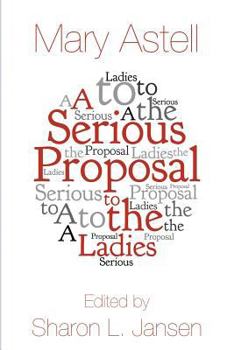A Serious Proposal to the Ladies: Parts I and II (Broadview Literary Texts)
Select Format
Select Condition 
Book Overview
Throughout her life, in her personal relationships as well as in her role as a public intellectual, the English thinker Mary Astell (1666-1731) supported women, wrote to and for women, and, to the greatest extent possible, moved from advocacy for to action on behalf of women. In her first published work, A Serious Proposal to the Ladies (London 1694), Astell proposed the establishment of an educational institution for women aimed solely at fulfilling their needs, a place where women could withdraw from a harsh and threatening world controlled by men and organized to suit men's desires, irrespective of women's. Perhaps nowhere is her feminist position more clearly articulated than on the title page of this, her first publication: she addresses herself to women, her aim is "the advancement of their true and greatest interest," and she identifies herself as "a lover of her sex."But, despite its importance, no previously available edition of A Serious Proposal to the Ladies has addressed the complications of Astell's prose style, and none has added the kind of glossing and notes that will assist student readers in their engagement with her distinctive voice. This edition, designed for classroom use, provides an ample introduction, a carefully modernized text, helpful glosses and notes, and a useful bibliography with references for further reading.
Format:Paperback
Language:English
ISBN:0615954030
ISBN13:9780615954035
Release Date:February 2014
Publisher:Saltar's Point Press
Length:136 Pages
Weight:0.48 lbs.
Dimensions:0.3" x 6.0" x 9.0"
Customer Reviews
1 rating
A Serious Proposal, parts 1 and 2
Published by Thriftbooks.com User , 24 years ago
Mary Astell is one of the first European females to write directly on issues of philosophy, politics, and rhetoric; like other women writers she also writes about religion and morality, as she proposes the foundation of an educational/religious institution for single ladies. This book has complete editions of both books 1 and 2 of Astell's A Serious Proposal to the Ladies (1694, 1697), with facsimiles of the original title pages, extensive footnotes, an excellent introduction, bibliography, and an index at the back. The introduction is an excellent overview of Astell's political and philosophical context. Of particular interest is Springborg's coverage of Astell's debates with John Locke, and Astell's use of Descartes and the Port-Royal Logic. Springborg also draws connections between Astell and Daniel Defoe, Richard Steele, Lady Mary Wortley Montagu, Samuel Richardson, and others. This book is a must for anyone interested in women's contributions to philosophy, education, religion, or politics in the English enlightenment.





